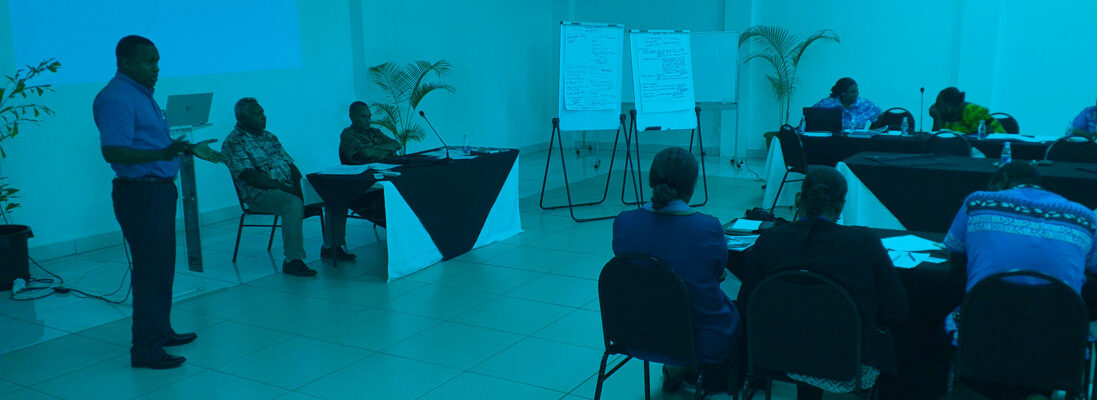Validadtion workshop: Vanuatu National Investment Policy Statement
In 2018, the ADB’s private sector development initiative (PSDI) following a request from the Ministry of Tourism, Trade, Commerce and Ni Vanuatu Business (MTTCNB) undertook a review of Vanuatu’s national investment policy Statement (NIPS) in collaboration with the Vanuatu Investment Promotion Authority (VIPA).
ADB’s PSDI funded consultant spent 19 working days in-country on the review project. From 19 November to 7 December 2018, the consultant undertook a diagnostic visit which involved consultation with relevant government and private sector agencies and other stakeholders in both Port Vila and Luganville. A follow up visit made between 25 – 29 March 2019 saw outcomes from the diagnostic visit discussed with key stakeholders and a draft of the NIP statement produced.
The purpose of this workshop is to validate the draft NIPS complied by the ADB consultant and VIPA as country counter-part. This validation workshop has several objectives:
- To summarize existing investment policies – Vanuatu’s last NIPS was prepared in 2005. This report includes summaries of Vanuatu’s investment related policies, thereby enabling preparation of an updated NIPS.
- To identify actions enabling efficient and effective implementation of proposed changes to the foreign investment approval process – The Foreign Investment Bill brings the foreign investment approval process more in line with international good practice. There are a number of areas however that will need to be addressed to enable its effective implementation.
- To identify and suggest ways to address problematic aspects of Vanuatu’s current location offer – Vanuatu’s Trade Policy Framework, which includes investment related areas, is currently undergoing review with the aim of identifying reform recommendations to be implemented over the coming 5 years. This report discusses a number of issues hindering investment that should be considered within the final policy reform matrix.
- To suggest ways to enhance Vanuatu’s investment promotion efforts – The Vanuatu Investment Promotion Authority (VIPA) is the lead agency responsible for investment promotion. The Investment Bill provides a foundation for strengthening its current efforts. This report identifies priority issues that will need to be addressed in order to realize substantive improvements.
- Attracting private sector investment, particularly foreign direct investment, is critical to achieving sustainable, inclusive economic development. This is because of the benefits it brings to the economy, such as investment capital, employment, new value-added activities and increased exports.
The workshop was attended by more than 30 participants comprised of both public and private sector representatives. Engagements by participants has been very excellent with the majority confirming their support to the document as is. Outcomes will be summarised and form part of the final document where appropriate.
To be successful a country needs to be both attractive for investment, as well as be able to attract it. This requires a strategy for improving a country’s location offer, as well as a strategy for marketing it to investors.
The National Sustainable Development Plan 2016 to 2030 (NSDP) sets out Government’s vision for the country’s future development. While economic growth is seen as important, it is to be pursued in a balanced way that ensures integrity of the natural environment is maintained; benefits are shared among the wider population; and the country’s cultural heritage continues to underpin a peaceful, just and inclusive society.
In relation to the economy, it seeks to improve the country’s attractiveness for private investors and encourage greater investment in rural areas. To achieve this it emphasizes improving business regulation, infrastructure services, urban-rural linkages and the capabilities of, and opportunities for, citizens to actively participate in the formal economy.
Implementing the NIPS once approved will assist in addressing the key components of the the National Sustainable Development Plan 2016 to 2030 (NSDP) which sets out Government’s vision for the country’s future development.
While economic growth is seen as important, it is to be pursued in a balanced way that ensures integrity of the natural environment is maintained; benefits are shared among the wider population; and the country’s cultural heritage continues to underpin a peaceful, just and inclusive society. In relation to the economy, it seeks to improve the country’s attractiveness for private investors and encourage greater investment in rural areas. To achieve this it emphasizes improving business regulation, infrastructure services, urban-rural linkages and the capabilities of, and opportunities for, citizens to actively participate in the formal economy, which if this policy is implemented successfully will contribute big time in this regard.



